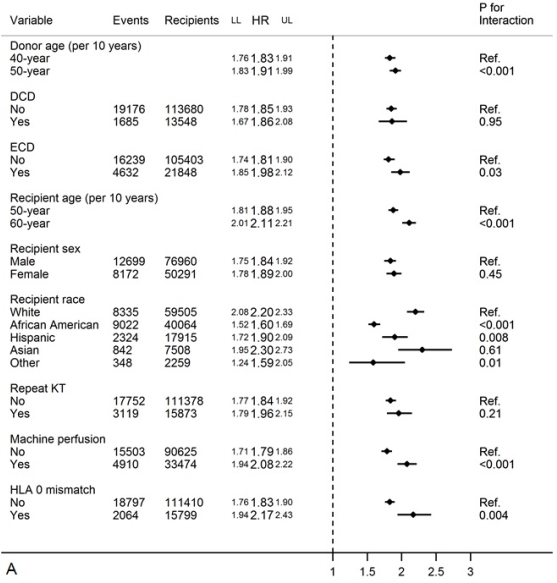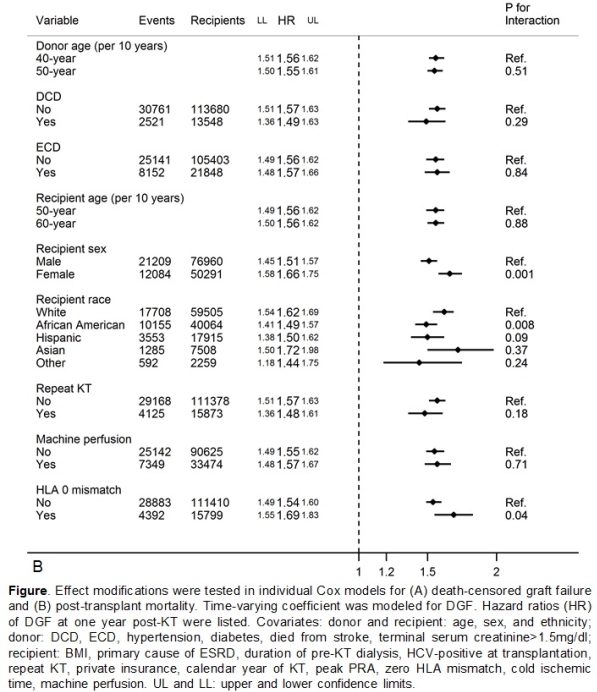Impact of Delayed Graft Function Varies by Demographic and Clinical Characteristics in Deceased Donor Kidney Transplantation.
JHU, Baltimore.
Meeting: 2016 American Transplant Congress
Abstract number: 506
Keywords: Graft failure, Graft function, Kidney transplantation, Mortality
Session Information
Session Name: Concurrent Session: Kidney Transplant Recipient: Long Term Outcomes Session 2
Session Type: Concurrent Session
Date: Tuesday, June 14, 2016
Session Time: 4:30pm-6:00pm
 Presentation Time: 5:06pm-5:18pm
Presentation Time: 5:06pm-5:18pm
Location: Ballroom A
Single-center studies have suggested potential differences in the impact of DGF by recipients' biological susceptibility, quality of allograft, and immune compatibility. The goal of this study was to use national data to comprehensively explore these effect modification relationships.
METHODS: Using SRTR data from 127,251 adult kidney-only DDKT recipients from 2000-2014, we examined interaction terms between DGF and various factors in Cox models for death-censored graft failure (DCGF) and post-transplant mortality. We used time-varying coefficients for DGF to account for disproportional hazards.
RESULTS: Overall DGF was associated with 1.86-fold higher risk of DCGF, which was amplified in older recipients (aHR=1.88 at age 50, 2.21 at age 60); recipients of older donors (40-year:1.83, 50-year:1.91); ECD recipients (SCD:1.81, ECD:1.98); machine perfusion (static storage:1.79, machine perfusion:2.08), and zero HLA mismatch recipients (any mismatch:1.83, zero-mismatch:2.17) (Figure A). The association was attenuated in racial/ethnic minorities (White:2.20, African American (AA):1.60, Hispanic:1.90, other:1.59). DGF was associated with a 1.56-fold higher risk of mortality, which was amplified in female recipients (male:1.51, female:1.66) and zero-mismatch (any mismatch:1.54, zero-mismatch:1.69), while attenuated by AA race (White:1.62, African American:1.49) (Figure B).

CONCLUSIONS: DGF-associated risk of DCGF and post-transplant mortality in DDKT was amplified by recipient susceptibility and lower kidney allograft quality. Better understanding the impact of DGF will help select patients who are more likely to tolerate this temporary physiologic insult without affecting longer-term outcomes.
CITATION INFORMATION: Liao C, Massie A, Bae S, Muzaale A, Segev D. Impact of Delayed Graft Function Varies by Demographic and Clinical Characteristics in Deceased Donor Kidney Transplantation. Am J Transplant. 2016;16 (suppl 3).
To cite this abstract in AMA style:
Liao C, Massie A, Bae S, Muzaale A, Segev D. Impact of Delayed Graft Function Varies by Demographic and Clinical Characteristics in Deceased Donor Kidney Transplantation. [abstract]. Am J Transplant. 2016; 16 (suppl 3). https://atcmeetingabstracts.com/abstract/impact-of-delayed-graft-function-varies-by-demographic-and-clinical-characteristics-in-deceased-donor-kidney-transplantation/. Accessed February 16, 2026.« Back to 2016 American Transplant Congress
